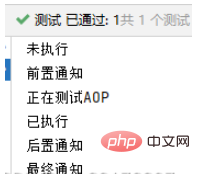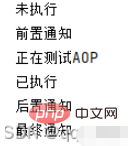Maison >Java >javaDidacticiel >Comment utiliser aop dans le projet SpringBoot
Comment utiliser aop dans le projet SpringBoot
- 王林avant
- 2023-05-11 15:04:131695parcourir
前言
IOC和AOP是Spring中的两个核心的概念,简单介绍一下我的理解:
IOC:控制反转,就是将以前由我们自己手动创建对象的过程交给了Spring,Spring帮助我们生产对象、管理对象、管理对象和对象之间的依赖关系。降低了代码的耦合度,方便我们后期对项目做维护。举个通俗一点的例子:
正常情况下,我们在家,饿了,自己做饭。
使用IOC情况下,我们在家,饿了,打电话给商家,饭送过来。
IOC就相当于商家,做饭就相当于创建对象。
也就是说正常情况下,当一个类需要调用其他类的方法时,我们手动通过new、工厂或者其他方式创建对象。
使用IOC情况下,我们只需要注入对象即可。
AOP:面向切面(方便)编程,可以对某一类对象进行监督和控制,在调用这类对象方法的前后去调用指定的代码,从而对一个方法进行扩展,从而达到增强模块功能的效果。举个通俗一点的例子:
正常情况下,直接吃饭。
使用AOP情况下,有个保姆关注着,吃饭前帮忙洗手,吃饭后帮忙收拾碗筷。
AOP就相当于保姆,吃饭就相当于带调用具体的方法。
也就是说,当我们想对方法进行补充时,并不去直接修改方法,而是通过AOP去补充。当我们不想补充或者需要更换补充的时候,直接操作AOP即可。
1、Pointcut: 切点,用于定义哪个方法会被拦截,例如 execution(* cn.springcamp.springaop.service..(…))
2、Advice: 拦截到方法后要执行的动作
3、Aspect: 切面,把Pointcut和Advice组合在一起形成一个切面
4、Join Point: 在执行时Pointcut的一个实例
4、Weaver: 实现AOP的框架,例如 AspectJ 或 Spring AOP
一、SpringBoot项目引入AOP依赖
<!--aop-->
<dependency>
<groupId>org.springframework.boot</groupId>
<artifactId>spring-boot-starter-aop</artifactId>
</dependency>启动类加上@EnableAspectJAutoProxy注解,可以省略。因为在AOP的默认配置属性中,spring.aop.auto属性默认是开启的。
也不需要再引入AspectJ依赖了。
二、普通方式
切面类代码:
package com.example.myblog.test;
import org.aspectj.lang.JoinPoint;
import org.aspectj.lang.ProceedingJoinPoint;
import org.aspectj.lang.annotation.*;
import org.springframework.stereotype.Component;
@Component
@Aspect
public class AOPTest {
//定义切入点
@Pointcut("execution(public * com.example.myblog.test.AOPTestClient.*(..))")
public void aspectTest(){}
//前置通知,切入点执行之前执行
@Before("aspectTest()")
public void doBefore(JoinPoint joinPoint){
System.out.println("前置通知");
}
//后置通知,切入点执行之后执行
@After("aspectTest()")
public void doAfter(JoinPoint joinPoint){
System.out.println("后置通知");
}
//最终通知,,切入点执行之后执行
@AfterReturning("aspectTest()")
public void doAfterReturning(JoinPoint joinPoint){
System.out.println("最终通知");
}
//异常通知,切入点抛出异常执行
@AfterThrowing("aspectTest()")
public void deAfterThrowing(JoinPoint joinPoint){
System.out.println("异常通知");
}
//环绕通知,切入点执行前、后执行
@Around("aspectTest()")
public Object deAround(ProceedingJoinPoint joinPoint) throws Throwable{
System.out.println("未执行");
Object result = joinPoint.proceed();
System.out.println("已执行");
//返回结果
return result;
}
}切点类代码:
package com.example.myblog.test;
import org.springframework.stereotype.Component;
@Component
public class AOPTestClient {
public void test(){
System.out.println("正在测试AOP");
}
}测试类代码:
package com.example.myblog;
import com.example.myblog.test.*;
import org.junit.Test;
import org.junit.runner.RunWith;
import org.springframework.beans.factory.annotation.Autowired;
import org.springframework.boot.test.context.SpringBootTest;
import org.springframework.test.context.junit4.SpringJUnit4ClassRunner;
@SpringBootTest
@RunWith(SpringJUnit4ClassRunner.class)
public class MyblogApplicationTests {
@Autowired
private AOPTestClient aopTestClient;
@Test
public void testAOP(){
aopTestClient.test();
}
}测试结果:

三、注解方式
自定义注解代码:
package com.example.myblog.test;
import java.lang.annotation.ElementType;
import java.lang.annotation.Retention;
import java.lang.annotation.RetentionPolicy;
import java.lang.annotation.Target;
//表示次注解可以标注在类和方法上
@Target({ElementType.METHOD, ElementType.TYPE})
//运行时生效
@Retention(RetentionPolicy.RUNTIME)
public @interface MyAnnotation {
//定义一个变量,可以接受参数
String desc() default " ";
}切面类代码:
package com.example.myblog.test;
import org.aspectj.lang.JoinPoint;
import org.aspectj.lang.ProceedingJoinPoint;
import org.aspectj.lang.annotation.*;
import org.springframework.stereotype.Component;
@Component
@Aspect
public class AOPAnnotationTest {
//定义切入点
@Pointcut("@annotation(com.example.myblog.test.MyAnnotation)")
public void aspectTest(){}
//前置通知,切入点执行之前执行
@Before("aspectTest()")
public void doBefore(JoinPoint joinPoint){
System.out.println("前置通知");
}
//后置通知,切入点执行之后执行
@After("aspectTest()")
public void doAfter(JoinPoint joinPoint){
System.out.println("后置通知");
}
//最终通知,,切入点执行之后执行
@AfterReturning("aspectTest()")
public void doAfterReturning(JoinPoint joinPoint){
System.out.println("最终通知");
}
//异常通知,切入点抛出异常执行
@AfterThrowing("aspectTest()")
public void deAfterThrowing(JoinPoint joinPoint){
System.out.println("异常通知");
}
//环绕通知,切入点执行前、后执行
@Around("aspectTest()")
public Object deAround(ProceedingJoinPoint joinPoint) throws Throwable{
System.out.println("未执行");
Object result = joinPoint.proceed();
System.out.println("已执行");
//返回结果
return result;
}
}切点类代码:
package com.example.myblog.test;
import org.springframework.stereotype.Component;
@Component
public class AOPAnnotationTestClient {
@MyAnnotation
public void test(){
System.out.println("正在测试AOP");
}
}测试类代码:
@Test
public void testAOPAnnotation(){
aopAnnotationTestClient.test();
}测试结果:

Ce qui précède est le contenu détaillé de. pour plus d'informations, suivez d'autres articles connexes sur le site Web de PHP en chinois!
Articles Liés
Voir plus- Comment gérer les connexions simultanées dans la programmation réseau Java ?
- Le potentiel innovant des frameworks Java dans le secteur de la santé
- Quels sont les rôles et les avantages de Spring Cloud dans l'architecture de microservices ?
- Les avantages de développement du framework Java dans les projets cloud natifs
- Méthodes de surcharge de la méthode main() en Java : est-ce possible ?

